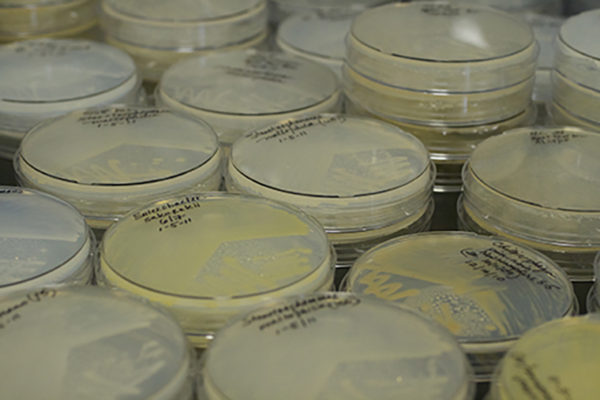Do cheaters have an evolutionary advantage?
What is it with cheating? Cheaters seem to have an immediate advantage over cooperators, but do they have an evolutionary advantage? A study published in Current Biology suggests the benefits of cheating change with its prevalence,in a population. Cheaters may succeed, for example, only when they are rare, and fail when they become so numerous they push out cooperators.
Microbes buy low and sell high
Microbes set up their own markets, comparing bids for commodities, hoarding to obtain a better price, and generally behaving in ways more commonly associated with Wall Street than the microscopic world. This has led an international team of scientists, including two from Washington University in St. Louis, to ask which, if any, market features are specific to cognitive agents.
Model organism gone wild
Some wild clones of social amoebas farm the bacteria they eat, but this is a losing strategy if nonfarming amoebas can steal the farmers’ crops. To make the strategy work, the farmers also carry bacteria that secrete chemicals that poison free riders. The work suggest farming is complex evolutionary adaptation that requires additional strategies, such as recruiting third parties, to effectively defend and privatize the crops, the Washington University in St. Louis scientists say.
Cheating — and getting away with it
We would all like to believe that there is a kind of
karma in life that guarantees those who cheat eventually pay for their
bad behavior, if not immediately, then somewhere down the line. But a
study of a new gene in the amoeba Dictyostelium discoideum suggests that, at least for amoebae, it is possible to cheat and get away with it.
Queller installed as new Spencer T. Olin Professor of Biology
Evolutionary biologist David C. Queller, PhD, was installed Oct. 16 as the Spencer T. Olin Professor of Biology in Arts & Sciences in a ceremony in Holmes Lounge.
Close family ties keep cheaters in check, study finds
Any multicellular animal poses a special difficulty for the theory of evolution. Most of its cells will die without reproducing, and only a privileged few will pass their genes. Given the incentive for cheating, how is cooperation among the cells enforced? In the Dec. 16 issue of the journal Science, Washington University in St. Louis biologists Joan Strassmann and David Queller suggest the answer is frequent population bottlenecks that restart populations from a single cell.

